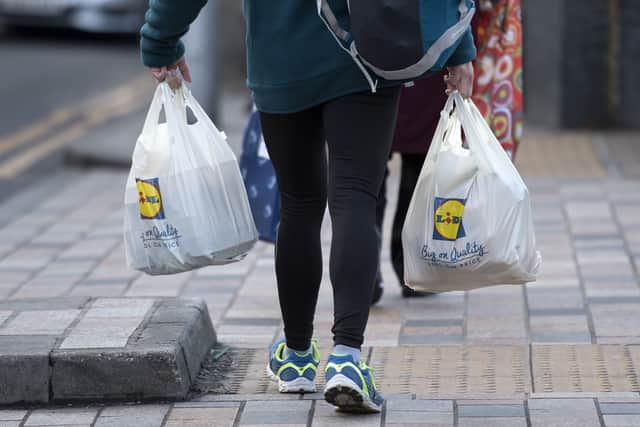Lidl swings to £76m annual loss amid battle to keep prices low during cost of living crisis
This article contains affiliate links. We may earn a small commission on items purchased through this article, but that does not affect our editorial judgement.
and live on Freeview channel 276
Lidl has revealed its British arm swung to an annual loss after battling to keep a lid on prices as the discount supermarket chain’s costs rose “across the board”. The group reported pre-tax losses of £76m for the year to February 28 against profits of £41.1m the previous year as it also invested heavily in the business.
Sales jumped 18.8% to £9.3bn over the year and the group said it increased its share of the supermarket sector. But the chain said the losses came as it faced a “challenging inflationary environment which led to an increase in costs across the board” and made significant investments in the chain.
The group “held firm on its promise” to keep price tags low for shoppers, spending £100m on prices, while it also invested nearly £50m in wage increases for staff and opened 50 new stores across the UK. Ryan McDonnell, chief executive of Lidl’s British business, said: “The entire retail market has seen inflation, and we are no exception.
“However, for us, what is important is that our price gap to the traditional supermarkets is as strong as it has ever been. We’ve invested in keeping our prices low for customers in what has been a very challenging year for most.”
Lidl, which marks 30 years in the UK in 2024, said it had opened a further 20 stores in the first half of its new financial year, with ambitions for “hundreds of new stores across Great Britain”. German discount chains Lidl and rival Aldi have been benefiting as consumers switch from the main players to cheaper alternatives to try to cut their food bill in the cost-of-living crisis.
Industry data from Kantar earlier this week showed that Aldi and Lidl now account for 17.7% of the UK grocery sector between them, with Lidl lifting its market share to 7.6% in the 12 weeks to September 3 from 7.1% a year earlier.


Mr McDonnell said: “We’ve always had a clear commitment to offer the best value to our customers and that is a promise we will always keep, even in uncertain economic times. Next year will mark 30 years of Lidl in Great Britain, and there is no ceiling on our ambitions for the next 30 as we see the potential for hundreds of new stores across Great Britain.”
The supermarket, which is part of the Schwarz retail group, has more than 31,000 employees in the UK and more than 960 stores and 14 distribution centres across England, Scotland and Wales.
Comment Guidelines
National World encourages reader discussion on our stories. User feedback, insights and back-and-forth exchanges add a rich layer of context to reporting. Please review our Community Guidelines before commenting.
